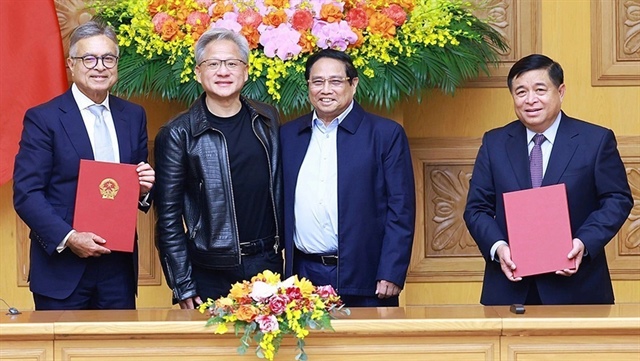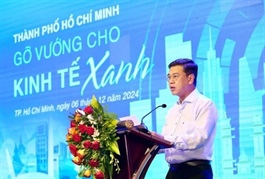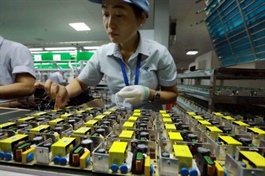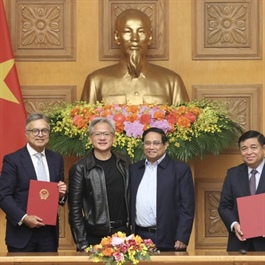Cooperation with US chipmaker NVIDIA to promote Vietnam’s AI industry: expert
Cooperation with US chipmaker NVIDIA to promote Vietnam’s AI industry: expert
A recent cooperative agreement between the Vietnamese government and U.S. chip giant NVIDIA will open opportunities aligned with the development of the artificial intelligence (AI) industry in Vietnam, according to Vo Xuan Hoai, deputy director of the Vietnam National Innovation Center.

Vietnamese Prime Minister Pham Minh Chinh (R, 2nd) and Jensen Huang (L, 2nd), founder and CEO of NVIDIA, witness the signing and exchange of an agreement between the Vietnamese government and the U.S. chipmaker to set up an AI R&D center in Vietnam, December 5, 2024. Photo: Vietnam News Agency |
Hoai spoke with Tuoi Tre (Youth) newspaper following the agreement signed on December 5 between the government and NVIDIA to set up an AI research and development center of the U.S. chipmaker in Vietnam.
Vietnam is the third market where NVIDIA has established such a center, following the United States, where the company is headquartered, and Taiwan, the birthplace of NVIDIA's founder and CEO, Jensen Huang, an expert noted.
Hoai added that the center will be built upon VinBrain, a Hanoi-based AI startup recently acquired by NVIDIA from Vingroup, Vietnam's largest private conglomerate.
He added that this demonstrates NVIDIA’s confidence in the success of investment in the AI industry in Vietnam.
Hoai said NVIDIA highly appreciates the support from the Vietnamese government and the prime minister, and the deal is the latest reflection of this trust.
Before deciding to establish the center in Vietnam, NVIDIA, the world's largest semiconductor chip designing and manufacturing group, had already shifted part of its billion-dollar production value chain to the Southeast Asian country.
Hoai underscored that the partnership is targeting the highest tier of NVIDIA's supply chain by establishing the center as a cornerstone of the AI ecosystem.
He expressed confidence that the center will act as a magnet, attracting enterprises involved in related equipment and investment opportunities. This, he said, will add significant value to the country and drive the growth of Vietnam's AI industry.
NVIDIA has a market capitalization of about $3,600 billion, the largest in the world, and employs 27,000 engineers and staff.
The future AI research and development center in Vietnam is forecast to initially have 100 engineers and staff, and the figure is estimated to reach 1,000 over five years.
Hoai believed in the following eight reasons for opening the facility in Vietnam.
Firstly, the workforce is young, dynamic, and eager to study STEM (science, technology, engineering, and mathematics). In addition, the cost of hiring a team of high-quality engineers for an AI center in Vietnam is lower than in the U.S..
Secondly, in recent years, many domestic technology unicorns and startups have operated successfully in the AI field in the country.
NVIDIA highly appreciates the country's potential for technological development, and government efforts to create policies focusing on promoting innovation, R&D, and high-quality human resources.
Thirdly, Vietnam has a strategic geographical position in Southeast Asia, close to China and India. This helps NVIDIA easily connect with potential markets through their investment.
Fourthly, Vietnam's political and economic stability makes NVIDIA feel secure to invest.
Fifthly, Vietnam has recently promulgated many preferential policies on foreign direct investment (FDI) attraction, especially in the hi-tech sector.
Sixthly, Vietnam, with a population of 100 million, offers a sizable market characterized by robust technological development and significant potential for adopting future tech products.
Seventhly, Vietnam’s digital infrastructure meets investors' requirements with reliable Internet networks, high-tech parks, national innovation centers, and AI data centers, providing a strong foundation for AI development.
Finally, the national government demonstrates a strong commitment to advancing the digital economy and promoting the application of high technology across socio-economic sectors.
The expert believes that AI technologies will become ubiquitous globally in the coming years. Therefore, the cooperation between the country and NVIDIA aligns perfectly with the current trends in AI development.























